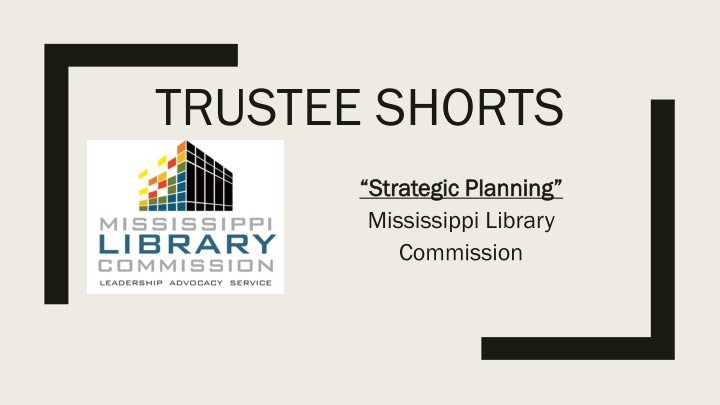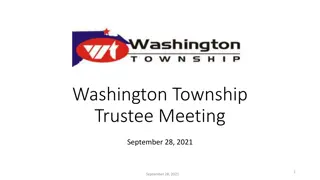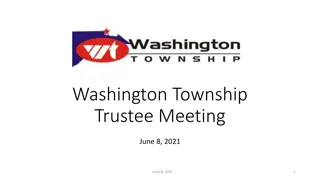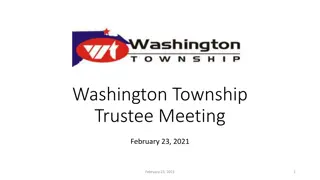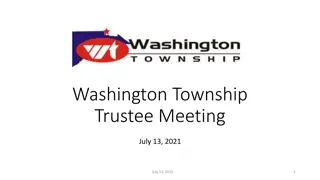TRUSTEE SHORTS
Trustees play a vital role in planning and organizing library systems, guiding growth, setting priorities, and keeping missions on track. Strategic planning involves mission statements, community needs analysis, goal setting, and continuous evaluation to ensure success. The planning process involves community representation, professional partnerships, and steps such as assessing current state, setting goals, and utilizing tools for planning. Development of flexible goals, setting specific objectives, and implementing evaluation schedules are key for effective library strategic planning.
Download Presentation

Please find below an Image/Link to download the presentation.
The content on the website is provided AS IS for your information and personal use only. It may not be sold, licensed, or shared on other websites without obtaining consent from the author.If you encounter any issues during the download, it is possible that the publisher has removed the file from their server.
You are allowed to download the files provided on this website for personal or commercial use, subject to the condition that they are used lawfully. All files are the property of their respective owners.
The content on the website is provided AS IS for your information and personal use only. It may not be sold, licensed, or shared on other websites without obtaining consent from the author.
E N D
Presentation Transcript
TRUSTEE SHORTS Strategic Planning Strategic Planning Mississippi Library Commission
Strategic Planning Trustees are responsible for planning and organizing the library system. Guides the grow and development of the library system and the community. Establishes priorities in order to meet the library s and the communities needs. Keeps the mission and goals of the library in perspective and on track. Continuous process Strategic plans are flexible
Strategic Plans Include: A mission statement. Description of the service area and communities. Summary the library system s needs. Statement of general goals. Details of services, programs, personnel, collection and facilities. Priorities. Timetable for goals and objectives. Assignments and responsibilities. Publicity campaign to accompany changes. Provision for evaluation and reassessment.
The Planning Process By accomplishing objectives in an orderly fashion, the goals of the library system should be attained. The entire community needs to be represented in planning discussions. Seek out professional partners like City planning departments or tourism bureaus.
Steps in Planning : a good plan addresses the following Where are we now? What do we want to do? Where do we want to go? How can we accomplish this? How long should it take us? How will we evaluate our work?
Tools for Planning Library Statistics Census Information Annual Library Program Evaluation Focus Groups Staff Reviews Consider an outside Consultant
Developing Goals Support the mission statement. Goals should be flexible. Remember planning is a continuous process. Trustees, Library Director, and Staff should take part.
Setting Objectives Objectives are specific. Short range goals. Should support the boards overall goals. Utilize staff to craft realistic timetables.
Evaluation Develop a schedule for reviewing the strategic plan. Director should present evaluations on an on-going basis Programs Projects Services
Questions and Formal Training? Mississippi Library Commission 1-800-647-7542 Contact your designated Library Consultant Mac Buntin (601-432-4035) kbuntin@mlc.lib.ms.us Lacy Ellinwood (601-432-4154) lellinwood@mlc.lib.ms.us Ally Watkins (601-432-4066) awatkins@mlc.lib.ms.us
